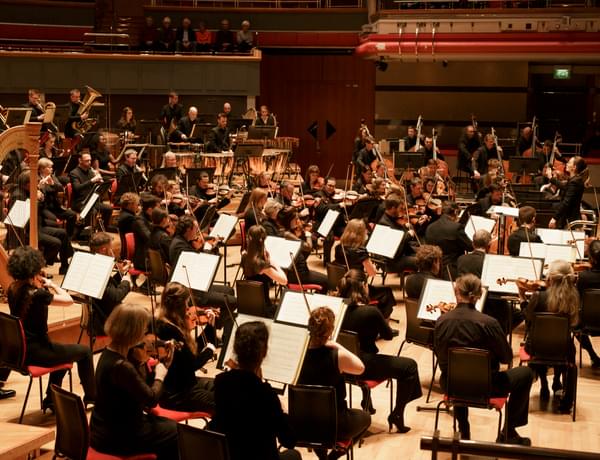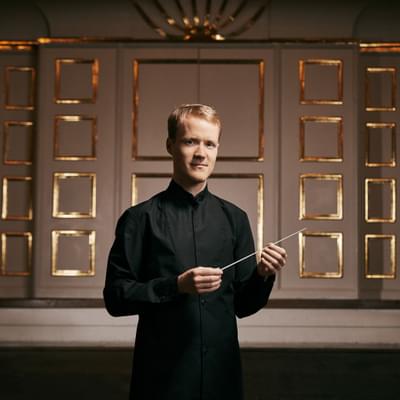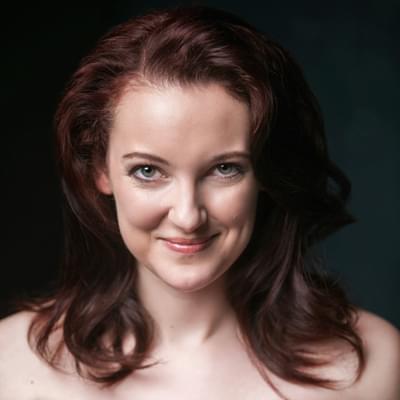Viennese New Year

Full programme
- Strauss II, Die Fledermaus: Overture (8mins)
- Lehár, Giuditta: Meine Lippen* (4mins)
- Josef Strauss, Dynamiden Waltz (10mins)
- Puccini, Gianni Schicchi: O mio babbino caro* (3mins)
- Strauss II, Perpetuum mobile (3mins)
- Smetana, The Bartered Bride: Overture (7mins)
- Beethoven, Symphony No. 9: Scherzo (13mins)
- Strauss II, Wein, Weib und Gesang (10mins)
- Lehár, The Merry Widow: Vilja Song* (6mins)
- Strauss II, On the Beautiful Blue Danube (9mins)
Performers

Christoph Koncz
Conductor
Jennifer France
Soprano
Unfortunately, Francesca Chiejina is unwell and unable to join us for this concert. We are grateful to Jennifer France for stepping in at short notice.
Programme Notes
As sweet as apple strudel and as fizzy as champagne, it simply wouldn’t be New Year without the music of Johann Strauss and friends! There’ll be elegant waltzes, playful polkas, and good old-fashioned operetta romance. So let the CBSO and Austrian maestro Christoph Koncz whirl you back to a more glamorous age, as we raise a glass to the start of another great year of music. Prosit!
The Vienna of the Strauss family was Europe’s first great multinational city. More than just the capital of Austria, it was the heart of an empire that stretched from the Swiss Alps to the Ukrainian steppe, and from the Adriatic Riviera to the bear-infested hills of Bohemia. In its nineteenth century golden age, its elegant dance halls and bustling coffee houses set the rhythm of a continent.
For pure multicultural fun, nothing tops Johann Strauss’s operetta, Die Fledermaus (1874), which makes a perfect opening for today’s celebration. Take an Italian tenor, a Russian prince, a French maid, and a (pretend) Hungarian countess - and just add champagne! The first notes of the overture could almost be three bottles popping open.
The story? It’s a Saturday night in Vienna in the early 1870s. Gabriel von Eisenstein is preparing to spend a week in gaol for insulting a policeman. His wife Rosalinde has caught the eye of an admirer. Eisenstein’s friend Falke is out for revenge, after one of Eisenstein’s drunken pranks left him stuck in the middle of town dressed as a bat (Fledermaus). And an eccentric Russian billionaire is throwing the biggest party Vienna has ever seen. One night brings them all crashing together in a romantic tangle so crazy that all anyone can do is blame it on the Bolly.
Still, Vienna has never needed much excuse for a good time. Lehár’s 1934 operetta Giuditta is the tale of a flame-haired beauty who breaks hearts across Italy and North Africa. Giuditta’s showstopping Meine Lippen sie küssen so heiss begins with a blaze of Latin passion, but before long she’s gliding into a classic Viennese waltz. And once the party’s over in Vienna, a shrewd musical businessman like Lehár or Strauss knew that there was always good business to be done in Budapest. (Vienna’s all-dancing empire was called Austria-Hungary for a reason). This number from Johann Strauss II’s 1892 opera Ritter Pázmán is a Czárdás – a traditional Hungarian dance that begins slow and sultry before accelerating into an ever-wilder whirl of gypsy fiddles and clarinets. You can almost taste the paprika.
It's a gift that ran in the family – and with the Johann Strauss Orchestra in demand across Europe, in 1853 Johann recruited his reluctant younger brother Josef (a successful civil engineer) to join the firm. “You are the most talented of us all” he told him (flattery is always a good strategy), and Josef went on to write more than 200 dances, including one of the most infectious of all waltzes: Dynamiden – written for the Viennese Industrialists’ Ball in 1865. Inspired by technological progress (and because in Vienna, scientists danced too), its slow introduction depicts (said Josef) the “mysterious powers of magnetism”.
And after that spin around the dancefloor, we’re off to Italy. Puccini was fond of Vienna too (he was good friends with Lehar) but his flair for an unforgettable romantic tune isn’t always exactly what it seems. His opera Gianni Schicchi (1918) is actually a fast-moving black comedy, and while O mio Babbino Caro (“Oh my beloved daddy”) sounds just like a soaring declaration of love, young Lauretta is actually turning all her pester-power on her all-too-devoted dad. You can’t blame him for giving way.
Back in Vienna in the carnival season of 1861, the talk of the town was a ball billed as “Carnival Perpetuum Mobile” – an all-night party, in which the dance music would play non-stop till dawn. The Strauss brothers took turns conducting in relays, and Johann came up with the ingenious Perpetuum Mobile. To an unstoppable dance rhythm, each section of the orchestra gets a chance to strut its stuff as the music hurtles cheerfully onwards. Strauss called it Ein musikalische Scherz (A musical joke) - though you might have to wait till the end for the punchline…
And what could be more Viennese than ending our first half in (wait for it) Prague? The gorgeous, glittering capital of Bohemia has always adored music – and when the brewer’s son Bedřich Smetana wrote his operatic rom-com The Bartered Bride in 1866, he wanted nothing more than a smash hit. “Composing it was child’s play!” he admitted, and it turned out to be the happiest thing he ever wrote - a tale of young love, set in a Czech village where the sun always shines, the circus is always in town and (naturally) the beer is excellent. The overture sets the mood: unstoppable energy, a dash of romance and some irresistible dance rhythms.
© Richard Bratby
Featured image © Andrew Fox